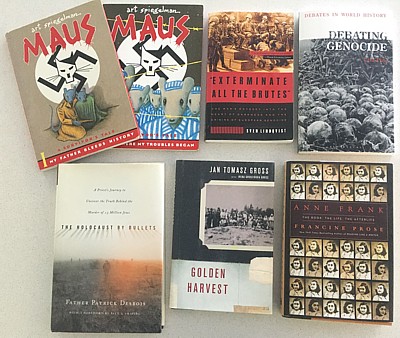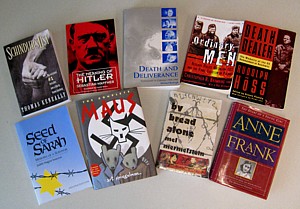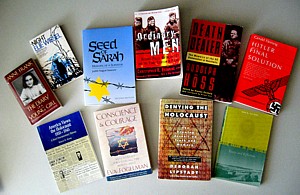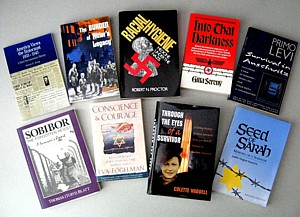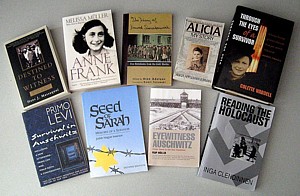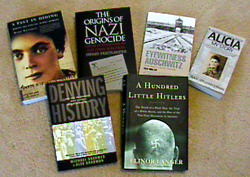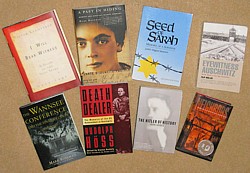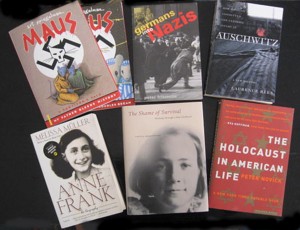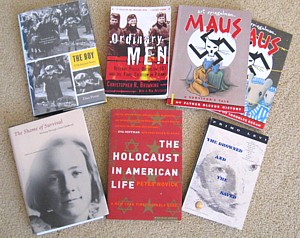Old
Announcements
(back to top)
- Dec. 12 , 2007: I don't have the prerequisite--can I enroll
in this course anyway?
This course has as a prerequisite any course in the Hist 133 series, or
permission of the instructor. I grant permission to students who have sufficient
background in German or Holocaust history--another relevant course (including
high school electives), substantial independent reading, films, museum
visits would all count. If you are highly motivated and are willing to
do some preparatory reading, I can also let you into the course. (Since
this is a discussion-based course, if you don't have the background, you
will feel left out of the discussion and your grade will suffer.)
Recommended titles for preparation are:
- Doris Bergen, War
& Genocide: A Concise History of the Holocaust (R&L, 2002)
($22/15
at amazon)
- Ronnie Landau,
The Nazi Holocaust (Ivan Dee, 1994/2002)
UCSB: D804.3.L355 1994
- Deborah Dwork and
R.J. van Pelt, The Holocaust: A History (2002)
($13/10
at amazon)
- Jackson Spielvogel,
Hitler and Nazi Germany: A History (Prentice Hall, 1992/1996)
UCSB: DD256.5 .S68 1996
- Dec. 12, 2007
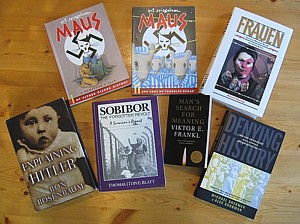 :
Here are the readings for Winter 2008: :
Here are the readings for Winter 2008:
- Art Spiegelman, Maus: A Survivor's Tale,
vols. 1 & 2,(Pantheon 1986, 1992; boxed set 1993)
v.1
amazon $7 used, $10 new
v. 2
amazon $7 used, $10 new
- Alison Owings, Frauen: German Women Recall
the Third Reich (Rutgers, 1995) (amazon
$12 used, $22 new) [the author will be a guest speaker in the class]
- Ron Rosenbaum, Explaining Hitler: The
Search for the Origins of His Evil
(Harper 1999) (amazon
$11 new 9 used)
- [title changed 1/1/08]Thomas Toivi Blatt, From the Ashes
of Sobibor: A Story of Survival (Northwestern, 1997)(amazon
$14 new, $13 used)
( [the author will be a guest speaker in the class)
- Viktor Frankl, Man's Search for Meaning (Beacon,
2006 [1946, 1959])
- Michael Shermer, Alex Grobman, Denying History:
Who Says the Holocaust Never Happened and Why Do They Say It? (UC
Press, 2002) (amazon
$19 new, $7 used)
- Jan. 7, 2008: The 2008 syllabus
is now available.
- Jan. 23, 2008: Please note that tomorrow, Thu. Jan.
24, Sobibor survivor Thomas Blatt will be speaking in HSSB 4020, 12:30-1:45pm.
He is the author of our reading for week six, Feb. 25.
- also, I have uploaded Erin's
annotated bibliography for Maus as an example for how to do
these. I would like to discuss your reactions in our next class meeting.
- And don't forget: next Monday, Jan. 28, at 5:30 at 524 Chapala
St., Alison Owings will be presenting about the women in her book
Frauen.
- Jan. 28, 2008. For directions to tonights presentation,
see the bottom of the Jan. 28 announcement
on my Hist 133D webpage. Alison Owings will be joining us in class
today until 3pm.
- Feb. 4, 2008: I don't think the annotated bibliography
assignment is working out very well (I don't think that is very useful).
I'd like to discuss this with you more next week. I think the entries should
be more focused around content, or specific questions.
- Feb. 4, 2008: Cathryn (and I) recommend this 3-hour
2005 BBC miniseries "Auschwitz: The Nazis and the Final Solution,"
published in book form as Auschwitz: A New History. It is available
on the web, broken into 9 segments (click through to view): list
of 9; direct link to
1.
- Mar. 11, 2008: These are the times for our final meetings
next Monday, 3/17:
10am: Amber, Amanda, Aaron
10:30: Josh, Lynn, Adan
11am: Rachel, Mackenzie, Cathryn
11:30: Diana, Chris, Erin
- It's not a real oral exam, I just want to hear from you some reflections
about what you got out of the course, what questions still remain, and
maybe what your future plans are and such like.
- Finally, the denier film clip that uses my website is at:
<http://www.onethirdoftheholocaust.com/mov_pages/30_mov.html>.
As I said, the author is completely accurate in what he says about me &
those items from my website. He is trying to argue (I think), that I contribute
to making Germans feel guilty about the Holocaust, so they don't make as
many babies. Go figure.
The segment about my site starts about 2 mins. into the 7:27 episode #30.
For the entire list of clips, see: <http://www.onethirdoftheholocaust.com/>
For an impression of the bizarre logic of today's deniers, sample a clip
or two. Segment 13, for instance, examines Sobibor, and uses Thomas Blatt's
model of the camp as "evidence" for this denier's pseudo-argument.
(The explanation to his rhetorical argument in that segment is that those
80,000 bodies--buried across that whole area of the camp--were dug up in
1942-43 and cremated, and the "mass graves" of the camp phase
documented by the map and model are graves of the ash remaining from the
partially decomposed corpses burned on outdoor grates.
- Mar. 19, 2008: I'm beginning to upload the sample
bibliographies:
- Oct. 28, 2009: It is important to note
that we will have DIFFERENT READINGS for the 2010 course offering,
which will also be a "DR" (directed readings) course, and thus
organized somewhat differently with a different writing assignment. See
course description, below.
So: do not buy the books for this course yet!
- See also my Hist 133D course website: My Hist
133D and 133DR courses are closely linked: in 133D we will read two paperbacks
(Fritzsche's Germans into Nazis, and vols I+II of Maus) in
addition to the textbook and essays in the course reader.
Both of those paperbacks are also part of the readings for 133DR, and several
texts in the 133D course reader are chapters from the other books for 133DR.
Thus the workload for 133DR is much less for students already in Hist 133D.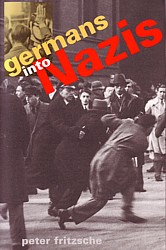
- Dec. 23, 2009: The course books for Winter 2010 will
be (it is ok to buy these!):
- Maus, vols. 1 & 2, (boxed set or individual) by
Art Spiegelman (Pantheon, 1986, 1993)
(amazon
v. 1 $7 used, $10 new; v.
2 $7 used, $10 new; both vols.together: $18-20)
- Germans into Nazis by Peter Fritzsche (Harvard UP, 1998)
($9/19
at amazon)
- Auschwitz: A New History by Laurence Rees (Public Affairs
Press, 2006) ($7/11
at amazon)
- Anne Frank: The Biography by Melissa Mueller (Holt/Owl,
1998) ($4
used)
- The Shame of Survival: Working Through a Nazi Childhood
by Ursula Mahlendorf (Penn State UP, 2009) ($20/22
at amazon)
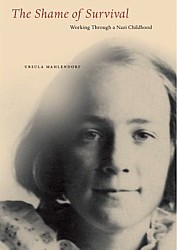
- The Holocaust in American Life by Peter Novick (Mariner
Books, 2000) ($6/12
at amazon)
- Jan.
4, 2010: The 2010 syllabus is now available: pdf
of syllabus.
- Jan. 5, 2010: The course is now full, and I'm not even able
to take students who are already in Hist 133D, sorry. For Monday 1/11:
read Maus and submit your reading notes on the course
GauchoSpace site by 10am that day. This page
of Maus resources may be helpful to peruse.
- Jan 12, 2010: book photo in header updated.
- Feb. 7, 2010:
- Genocide lecture on Tuesday, 2/9 (w/ PS on proposals)
I know (hope) you are busy with the Anne Frank biography for tomorrow,
but I'd like to invite you to what promises to be a fascinating lecture
on Tuesday.
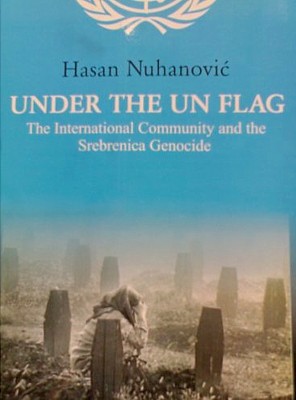 Under the U.N. Flag: The International Community and the Genocide
in Srebrenica Under the U.N. Flag: The International Community and the Genocide
in Srebrenica
lecture by Hasan Nuhanovic (UN translator, survivor and author), Bren
1414, 3:30-4:45pm
Hasan Nuhanovic is visiting California for a lecture in the UCLA Human
Rights Colloquium Series and joins us at UCSB to give a talk on the events
surrounding the fall and genocide of the town of Srebrenica in eastern
Bosnia in July 1995. Nuhanovic is a Bosnian Muslim who worked as a translator
for the United Nations. As such he worked very closely with the Dutch Battalion
(DutchBat3) tasked with protecting the unarmed population of Srebrenica.
His mother, father and brother were all killed in the genocide after the
Dutch Battalion refused to grant them, or any other civilians refuge within
the UN compound, as mass executions by the Serbian forces were taking place.
Mr. Nuhanovic's book, Under the U.N. Flag: The International Community
and the Genocide in Srebrenica (2007; amazon.uk
page) offers the first publicly available account of the terror and
inhumanity experienced by those seeking sanctuary from genocide who placed
their lives and their trust in the hands of the peacekeepers. Unarmed,
starved and deprived of basic human needs the people of the 'safe haven'
of Srebrenica placed their complete reliance on the promise of protection
by the United Nations. This book is compiled from firsthand experience
of the events by Hasan Nuhanovic as well as other survivors of the genocide.
It provides a detailed chronology covering the days leading up to the notorious
days in July 1995 when the genocide of Bosnian Muslims in Srebrenica began
and the subsequent period during which the world media continued to propagate
the message that nothing sinister was going on: it took the best part of
six years before genocide was officially deemed to have taken place in
2001. This unique account is both an exhilarating read and a major work
of historical reference.
You can find some interesting links, including video of Mr Nuhanovic, on
this Genocide
Event page.
- PS. Don't forget to bring a 1-2 page proposal about your research
paper topic to class this Monday. Some of the things it should contain
are:
- a title or working title that indicates the main theme you want to
work on;
- a summary description and explanation of your topic (1-2 paragraphs);
- an explicit statement/list of the problem or questions you will address;
- a list of some primary source materials and secondary literature you
will examine.
- Dec. 15, 2011: The books for the W'2012 offering of Hist 133DR are :
- Dan Porat, The Boy (Hill & Wang, 2010) (ca. $14/9 at amazon)
- Art Spiegelman, Maus vols. I and II (Pantheon 1986, 1991)(amazon v. 1 ca.$9 used, $14 new; v. 2 ca. $9 used, $15 new; both vols. boxed set: $18-24)
- Christopher R. Browning, Ordinary Men: Reserve Police Battalion 101 and the Final Solution in Poland ($4-10 at amazon)
- Peter Novick, The Holocaust in American Life (Mariner, 2000)($4-15 at amazon)
- Ursula Mahlendorf, The Shame of Survival: Working Through a Nazi Childhood (Penn State UP, 2009)($22 at amazon)
- Primo Levi, The Drowned and the Saved ($6-13 on amazon)
|
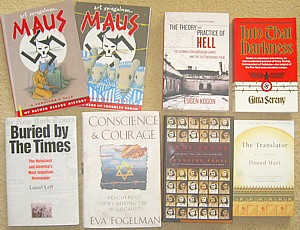 The
7 books for Spring 2013
The
7 books for Spring 2013